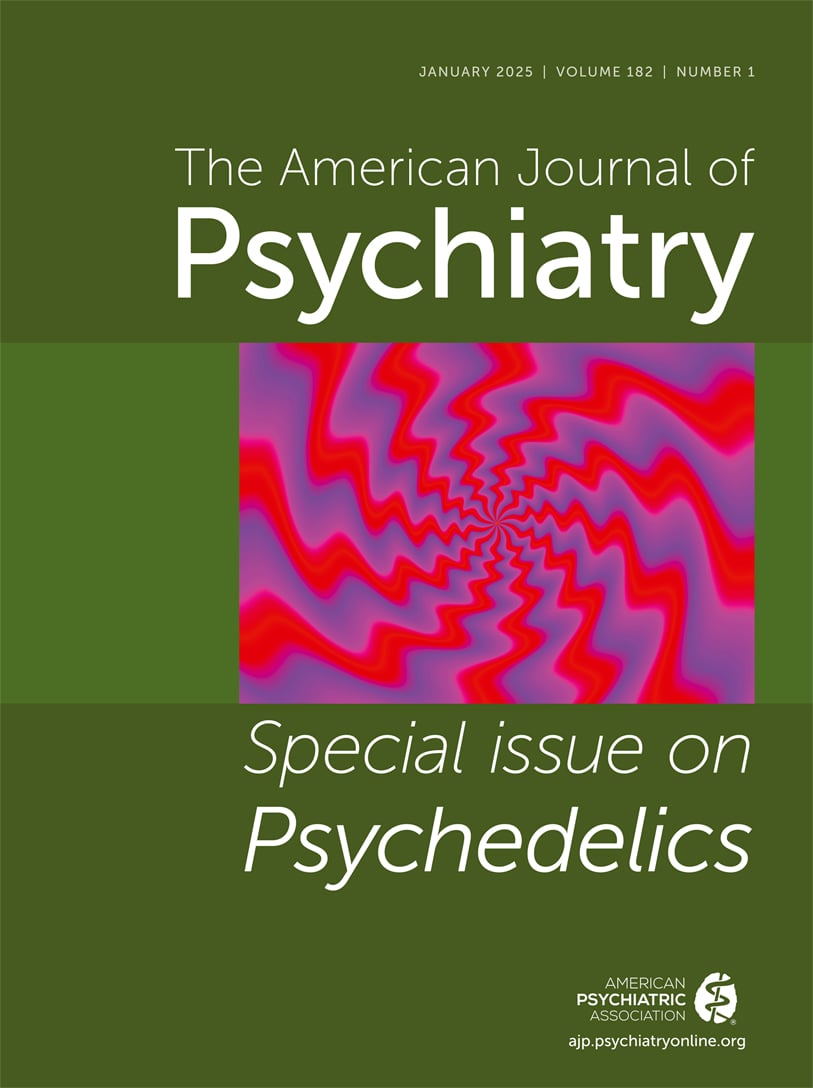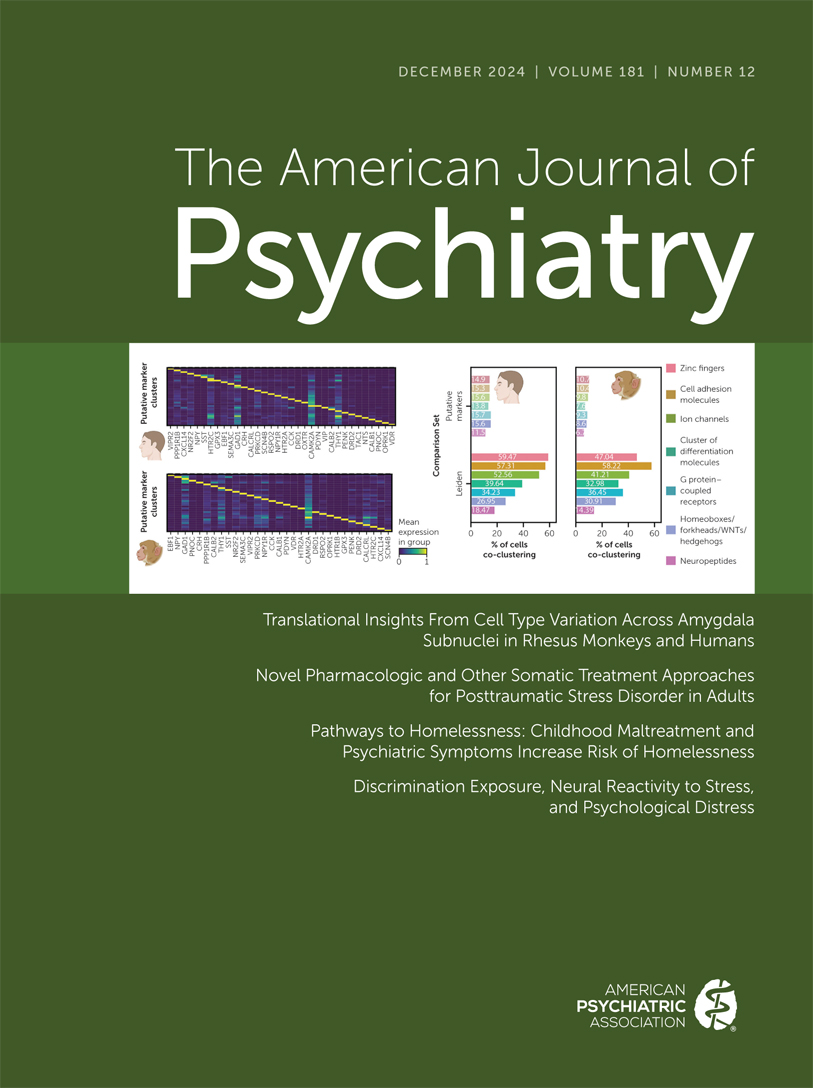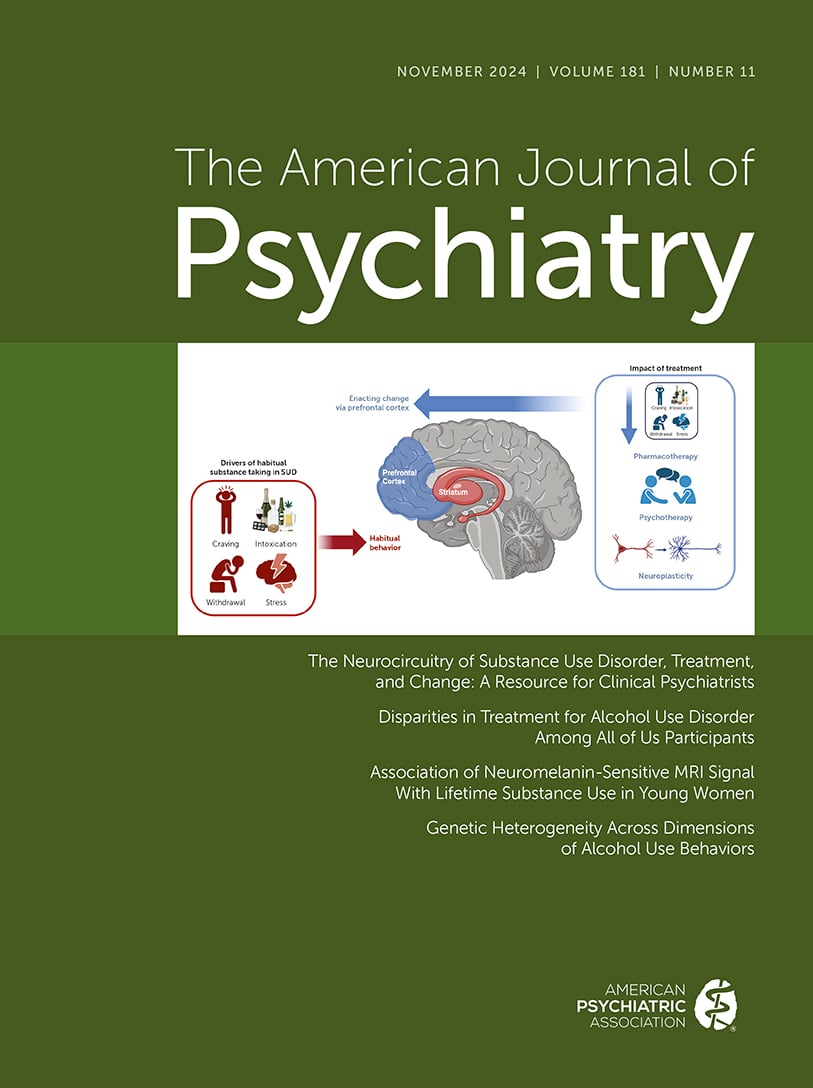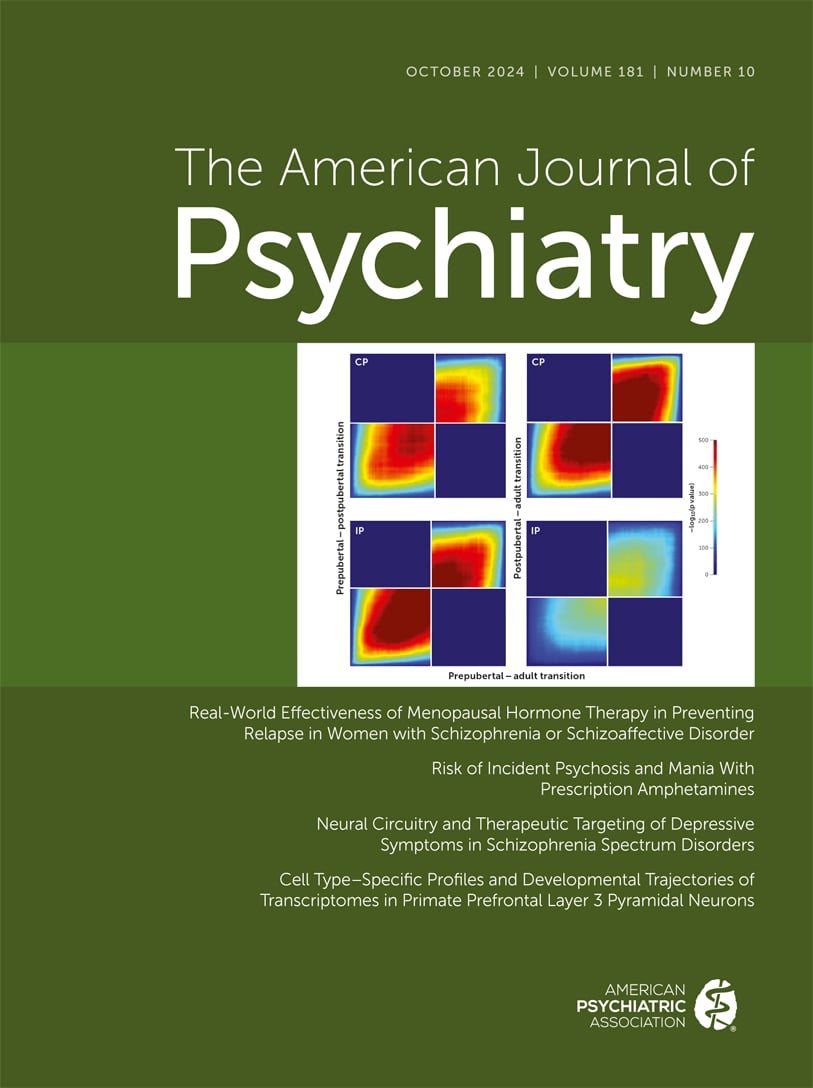American Journal of Psychiatry
- Volume 150
- Number 7
- July 1993
Publication date: 01 July 1993
Pages1000–1010It has been two decades since American troops were withdrawn from Vietnam, yet there has been little interest in resolving challenges that arose during the war regarding the ethical justification for military psychiatry's principles and field techniques ...
https://doi.org/10.1176/ajp.150.7.1000Publication date: 01 July 1993
Pages1011–1014OBJECTIVE: This study compared dissociative symptom areas in Vietnam combat veterans with posttraumatic stress disorder (PTSD) and in Vietnam combat veterans without PTSD. METHOD: The Structured Clinical Interview for DSM-IV Dissociative Disorders (SCID-D)...
https://doi.org/10.1176/ajp.150.7.1011Publication date: 01 July 1993
Pages1015–1019OBJECTIVE: The purpose of this study was to compare the memory function of patients with posttraumatic stress disorder (PTSD) to that of matched comparison subjects. METHOD: Vietnam veterans with combat- related PTSD (N = 26) were compared to physically ...
https://doi.org/10.1176/ajp.150.7.1015Publication date: 01 July 1993
Pages1020–1023OBJECTIVE: Many patients with posttraumatic stress disorder (PTSD) appear to have co-occurring symptoms of character pathology; however, to date there have been no empirical studies of comorbid clinician- rated axis II personality disorders in war ...
https://doi.org/10.1176/ajp.150.7.1020Publication date: 01 July 1993
Pages1024–1029OBJECTIVE: This study evaluated the relation between baseline clinical phenomena and response to amitriptyline in patients with posttraumatic stress disorder (PTSD). METHOD: Data were obtained from an 8-week placebo-controlled, double-blind study of ...
https://doi.org/10.1176/ajp.150.7.1024Publication date: 01 July 1993
Pages1030–1036OBJECTIVE: The Dissociative Experiences Scale has proved a reliable and valid instrument to measure dissociation in many groups, but its capacity to distinguish patients with multiple personality disorder from patients with other psychiatric disorders has ...
https://doi.org/10.1176/ajp.150.7.1030Publication date: 01 July 1993
Pages1037–1042OBJECTIVE: This study attempted to determine 1) the prevalence of dissociative disorders in psychiatric inpatients, 2) the degree of reported childhood trauma in patients with dissociative disorders, and 3) the degree to which dissociative experiences are ...
https://doi.org/10.1176/ajp.150.7.1037Publication date: 01 July 1993
Pages1043–1047OBJECTIVE: This study was intended to examine the extent of dissociative experiences that exist within a substance abuse population and to determine how demographic and clinical variables affect these experiences. METHOD: A total of 265 male veterans ...
https://doi.org/10.1176/ajp.150.7.1043Publication date: 01 July 1993
Pages1048–1052OBJECTIVE: Reported cases of multiple personality disorder have increased dramatically in the last decade. Few data are available on the treatment of multiple personality disorder. Current recommendations are based on the experience of individual ...
https://doi.org/10.1176/ajp.150.7.1048Publication date: 01 July 1993
Pages1053–1058OBJECTIVE: The authors sought to delineate the characteristics of female alcoholics with eating disorders. METHOD: The study subjects were 29 female Japanese outpatients and inpatients, 30 years of age or younger, with DSM-III-R diagnoses of either ...
https://doi.org/10.1176/ajp.150.7.1053Publication date: 01 July 1993
Pages1059–1062OBJECTIVE: Alcoholism is a problem of worldwide concern. Full appreciation of this international problem requires that adequate diagnostic measures be constructed and that comparable measures for different cultures be available so that valid differences ...
https://doi.org/10.1176/ajp.150.7.1059Publication date: 01 July 1993
Pages1063–1069OBJECTIVE: Many studies of the prevalence of mental disorders among residents of long-term care facilities have had substantial methodological shortcomings. This study was conducted to replicate a previous well-designed study and to examine additional ...
https://doi.org/10.1176/ajp.150.7.1063Publication date: 01 July 1993
Pages1070–1076OBJECTIVE: After defining the transitional residence in the linear continuum of possible residential settings for recipients of psychiatric services, the authors address the question of whether this continuum functions as designed. Do persons with serious ...
https://doi.org/10.1176/ajp.150.7.1070Publication date: 01 July 1993
Pages1077–1080OBJECTIVE: The aim of this study was to examine the reliability (examination stability) of the American Board of Psychiatry and Neurology (ABPN) Part II (oral) examination in psychiatry. METHOD: The authors analyzed the consistency (agreement between ...
https://doi.org/10.1176/ajp.150.7.1077Publication date: 01 July 1993
Pages1081–1084OBJECTIVE: The author's goal was to discover strategies used by psychotherapy supervisors judged to be excellent teachers. METHOD: In an earlier study, experienced teachers of psychotherapy rated the level of excellence of 34 different supervisors in 53 ...
https://doi.org/10.1176/ajp.150.7.1081Publication date: 01 July 1993
Pages1085–1089OBJECTIVE: The authors hypothesized that hypochondriacal patients mistakenly believe good health to be a symptom-free state and that they consider more symptoms to be indicative of disease than do nonhypochondriacal patients. METHOD: The Health Norms ...
https://doi.org/10.1176/ajp.150.7.1085Publication date: 01 July 1993
Pages1090–1097OBJECTIVE: This study examined the relation of smoking and medical history, social support, and hypnotizability to outcome of a smoking cessation program. METHOD: A consecutive series of 226 smokers referred for the smoking cessation program were treated ...
https://doi.org/10.1176/ajp.150.7.1090Article
Publication date: 01 July 1993
Pages1099–1101Cholecystokinin octapeptide (CCK-8) appears to modulate appetitive behavior, and in rodents, anxiety-related behavior. The authors studied CCK-8 in patients with bulimia nervosa. CSF concentrations of CCK-8 were measured in 11 drug-free female patients ...
https://doi.org/10.1176/ajp.150.7.1099Publication date: 01 July 1993
Pages1102–1104Twenty patients with myasthenia gravis and 15 patients with polymyositis/dermatomyositis were assessed with a structured interview. Fifteen patients (43%) were diagnosed with an anxiety disorder. Significantly more myasthenic patients (40%) than ...
https://doi.org/10.1176/ajp.150.7.1102Publication date: 01 July 1993
Pages1105–1107The authors found that 14 (46.7%) of 30 patients with panic disorder had alexithymia, compared with four (12.5%) of 32 patients with simple phobia. Consistent with the conceptualization of alexithymia as a psychological deficit affecting emotion ...
https://doi.org/10.1176/ajp.150.7.1105Publication date: 01 July 1993
Pages1108–1110This study investigated the prevalence of comorbid panic disorder in patients with recurrent wintertime episodes of major depression. The subjects were 38 patients (10 male and 28 female) who met the DSM-III-R criteria for major depression with a seasonal ...
https://doi.org/10.1176/ajp.150.7.1108Publication date: 01 July 1993
Pages1111–1113Since cholecystokinin (CCK) is known to be anxiogenic in experimental animals and to induce panic attacks in humans, lymphocyte CCK-8 concentrations were measured in 15 patients with panic disorder and 15 age- and sex-matched healthy subjects. The ...
https://doi.org/10.1176/ajp.150.7.1111Publication date: 01 July 1993
Pages1114–1115To clarify the meaning of the expressed emotion construct by testing its generalizability beyond psychiatric disorders, the authors measured family expressed emotion and glucose control in 35 diabetic patients. The critical comments component of expressed ...
https://doi.org/10.1176/ajp.150.7.1114Article
Article
Article
Article
Article
Past Issues
View Issues Archive
Vol. 182 | No. 1

Vol. 181 | No. 12

Vol. 181 | No. 11
